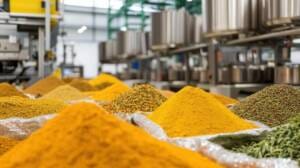
The spice factory project is one of the most successful and profitable projects in the food industry, thanks to the continuous and increasing demand for spices and seasonings around the world. Spices are an essential part of the daily kitchen, whether in homes or restaurants, as they add distinctive and varied flavors to food. Therefore, investing in a spice factory project provides a promising opportunity for investors.
In this article, we will discuss the steps to start a spice factory project, from choosing raw materials to the production stages, the challenges that the factory may face, in addition to important tips to ensure the success of the project.
The importance of the spice factory project
The growing demand for spices
Spices are an integral part of food cultures around the world. From India to the Middle East and Europe, the demand for spices and seasonings is increasing due to the increased interest in healthy and natural food, making the spice factory project a profitable and sustainable option. The diversity of products derived from spices, such as ready-made spice mixes and organic spices, makes this sector broad and diverse in opportunities.
Wide variety of products
The spice factory project allows the production of a wide range of products, such as:
Individual spices (pepper, turmeric, cumin, etc.)
Special spice blends (barbecue spices, oriental food blends, broasted blends)
Organic spices
Mixed and ground spices according to customer needs
This diversity gives the factory the flexibility to meet the various requirements of the local and global market.
Steps to establish a spice factory project
1- Feasibility study and site selection
The first step in a spice factory project is to prepare a comprehensive feasibility study to determine the expected cost of the project, available funding sources, and potential benefits. It is important to carefully choose the factory site to be close to sources of raw materials such as agricultural markets or agricultural areas that provide the required herbs and spices. Also, the factory must be close to major transportation networks to facilitate distribution.
2- Factory equipment
Spice factories need special equipment to prepare and process spices effectively. Basic equipment includes:
1- Grinding and crushing equipment: to grind spices and turn them into powder.
2- Screening devices: to separate impurities and obtain a fine and homogeneous powder.
3- Packaging equipment: to pack spices in attractive and suitable packages.
4- Mixing devices: to mix different spices to obtain customized blends.
Raw materials
The quality of spices depends on the quality of the raw materials used. It is always preferable to obtain spices from reliable sources known for their quality. Some spices can be imported from countries characterized by their cultivation such as India or Morocco, while some can be grown locally.
Spice Production Stages
1- Cleaning and Drying Stage
The first stage of manufacturing spices is cleaning and drying the herbs or seeds used. This stage requires special care to ensure that there are no impurities or moisture that affect the quality of the final product.
2- Grinding and Crushing Stage
After cleaning and drying the raw materials, they are ground and turned into powder using dedicated grinding equipment. Spices must be ground to certain degrees depending on the type of spice, as some can be very fine, such as hot pepper, or coarse, such as black pepper.
3- Packaging Stage
After the grinding process, spices are packed in special packages that maintain their quality and ensure ease of use. Packages vary from small bags for home use to large packages for restaurants or supermarkets.
Challenges Facing the Spice Factory Project
Market Competition
The spice market is witnessing great competition, whether from local or international companies. To avoid this competition, you must focus on the quality of the products and provide unique spices or customized blends that are not available in traditional markets.
Keeping up with health standards
The spice industry is one of the industries that requires adherence to strict health standards, from the cleanliness of raw materials to packaging methods. Quality certificates such as ISO or food safety certificates must be obtained to enhance customer confidence.
Logistical challenges
The process of transporting and distributing spices is one of the most important challenges, as the safety of the product must be ensured during the shipping and storage stages. Therefore, it is necessary to choose reliable transportation and distribution companies to ensure that the products reach the markets in good condition.
Tips for the Success of the Spice Factory Project
Investing in Research and Development
To maintain the competitiveness of the factory, you must invest in research and development. You can develop new spice blends, try innovative packaging, or even offer healthy and organic products that meet consumer interests.
Building a Strong Brand
Building a strong brand is essential to attract customers and build their loyalty. This can be done by designing attractive packaging, marketing online, and offering distinctive products that meet customer needs.
Focus on quality and sustainability
Quality is the first key to the success of any spice factory. It is important to ensure that high-quality raw materials are used and that products meet market standards. Sustainable practices can also be adopted in the factory, such as using environmentally friendly packaging materials, which can enhance the factory’s position in the market.
Choosing the right technology and equipment in a spice factory project
Technology plays a vital role in increasing the production efficiency and quality of spices in a spice factory project. It is essential to choose modern equipment that ensures accurate and smooth production processes. Advanced equipment can be relied upon to peel, dry and grind spices automatically, which contributes to reducing human errors and increasing productivity. Modern equipment also allows for the production of large quantities in less time while maintaining the quality of the final product.
In addition, advanced quality control technologies such as moisture and component analyzers can be used to ensure that the spices produced are in line with international standards and meet consumer expectations.
Quality Control and Supervision
Quality control is one of the most important factors affecting the success of a spice factory project. To ensure the provision of high-quality products, a special quality control department must be established within the factory. This department monitors all stages of production, starting from examining raw materials to the packaging stage. Spices are periodically inspected to ensure that they are free of any impurities or unwanted materials, and it is also ensured that the grinding process is carried out as required and according to the specified standards.
In addition, it is necessary to adhere to international food safety standards such as HACCP or ISO 22000, to ensure that the factory’s products comply with the health requirements required in local and global markets.
Developing new products
A spice factory project may include developing innovative products that are in line with consumer expectations. For example, it is possible to consider offering ready-to-use spice mixes that are suitable for certain dishes such as fish or meat seasoning, or developing products that meet the needs of people who follow certain diets such as organic or salt-free spices.
This diversity can help expand the factory’s scope of work and increase the chances of attracting new customers, which contributes to strengthening the factory’s presence in the market.
A spice factory project is an exciting and profitable investment opportunity, but it requires careful study and planning to ensure success. From choosing the right location, to obtaining high-quality raw materials, to adhering to health standards, every step plays a role in the success of the project. However, investors may face challenges related to competition and quality, so consulting specialists in this field may be necessary.
ProNano Food Industry Consulting Company provides specialized consulting services to investors wishing to enter the spices and seasonings sector. With its long experience in this field, ProNano can provide the best solutions to ensure the success of the spice factory project, including providing advice on appropriate equipment, production methods, and required quality standards. To contact ProNano and obtain specialized advice, you can visit our website or contact us
Read more about food product development


